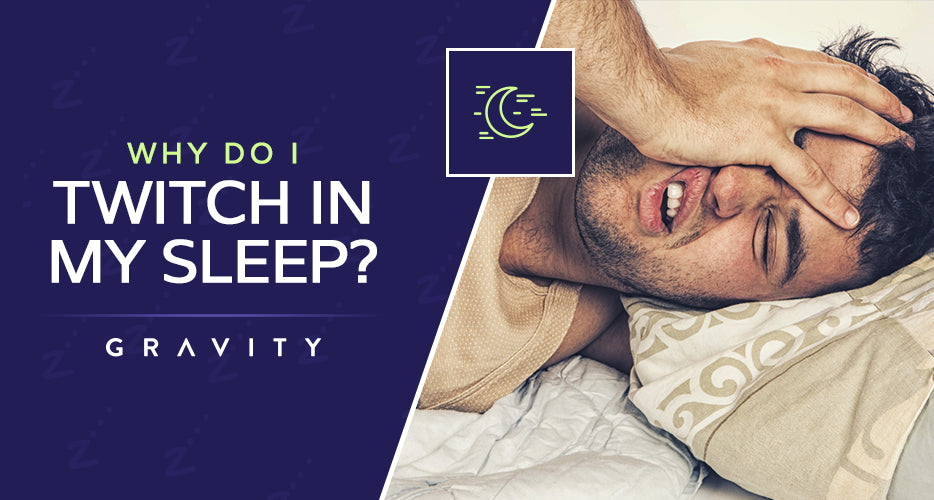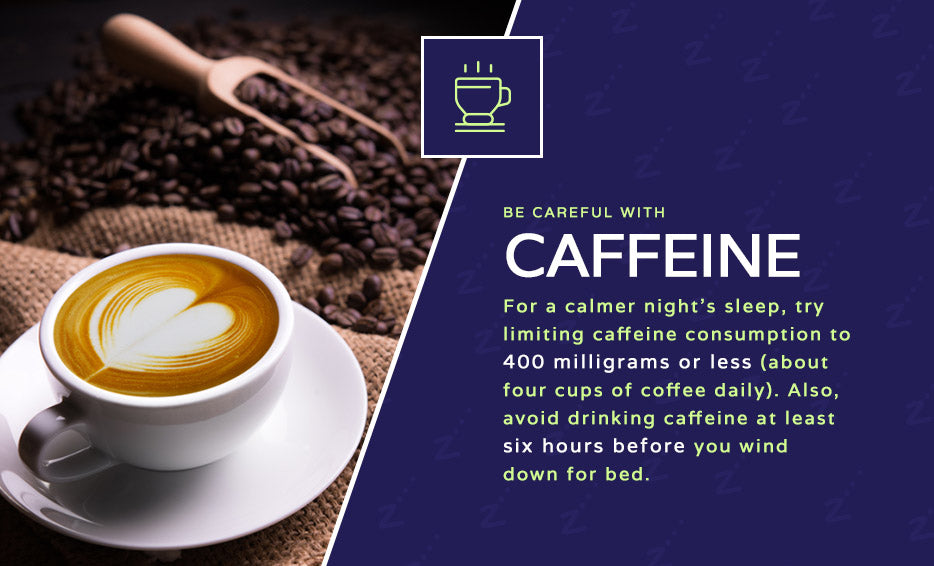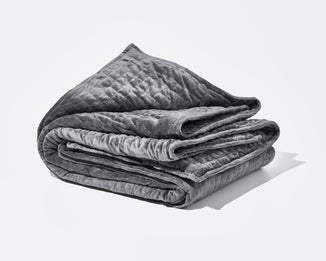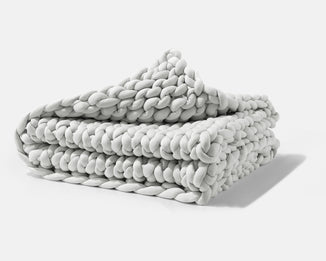
Jul 04, 2022
Why Do I Twitch in My Sleep?

Have you ever been on the cusp of falling asleep, only for your body to twitch and jolt you back awake? Believe it or not, it’s a pretty common occurrence. These sudden, involuntary muscle contractions, called hypnic jerks, are estimated to affect 60 to 70 percent of the population.
Hypnic jerks can be pretty annoying — not only for you, but also for your partner, who may occasionally end up on the receiving end of a particularly violent twitch. The good news? Hypnic jerks are a normal phenomenon and usually not a cause for concern. Keep reading to learn more about this unwanted bedtime activity, possible reasons you may twitch in your sleep and how to prevent it.

What Are Hypnic Jerks?
Hypnic jerks (also called sleep starts) are sudden, involuntary muscle contractions that happen as you fall asleep or during light sleep. They are a type of myoclonus, a catchall term for brief, involuntary muscle contractions involving a single muscle or muscle group. Hiccups and sneezes are other common types of myoclonus.
The term “hypnic jerk” is actually short for “hypnagogic jerk” and is so named because the phenomenon mainly occurs in the hypnagogic phase, the period between wakefulness and sleep. During this phase, you start to lose touch with reality as your body transitions into sleep.
How Is a Hypnic Jerk Described?
Hypnic jerks tend to affect one side of the body (i.e., the left arm and left leg). They can be small and unnoticeable, with some people continuing to snooze right through them. Other times, the movements can be so intense that they startle the affected person awake. These more intense movements are often associated with a sensation of falling, tripping or an electric shock upon awakening.
Who Is Most Commonly Affected by Hypnic Jerks?
Although people can experience hypnic jerks at any age, they are most common in adults. Some researchers believe this may be due to the fact that adults have high stress levels and drink more caffeine, both of which can trigger episodes of muscle twitching during sleep.
Are Hypnic Jerks Dangerous?
In general, hypnic jerks aren’t dangerous, even though they can be unpleasant. For most people, these jerky movements don’t happen often and are not a sign of any underlying health problems. But if they occur frequently, you may develop anxiety about going to bed. As a result, you may stay up later and deprive yourself of the sleep your body desperately needs.
In rare instances, people can be injured by hypnic jerks. For example, if your leg twitches, you could bruise it against the bed frame or kick a bedmate.
It’s also important to note that jerky movements upon waking up can be a sign of obstructive sleep apnea, a serious condition that causes the affected person to stop breathing during the night. If your jerky movements are accompanied by a loud gasp or snort, consult your primary care physician for an official diagnosis.

Why Do I Twitch in My Sleep? 5 Common Triggers
As with most sleep-related phenomena, researchers still don’t understand the exact mechanisms behind hypnic jerks. One popular theory is that hypnic jerks occur due to nerves misfiring in the brain. As we drift off to sleep, our breathing slows and our muscles relax. During this shutdown process, nerves can sometimes send the wrong signal to the muscles, causing muscle twitching.
Another interesting theory is that hypnic jerks are the by-product of evolution. Our early human ancestors slept in trees, and some scientists believe muscle twitching may have helped them ensure their sleeping position was secure enough before falling into a deep sleep.
Hypnic jerks could also be a basic reflexive action to dream-like imagery, such as a falling or tripping dream. In this case, sleep twitching may be the result of your brain thinking you’re in danger and trying to save you before you hit the ground.
Although research is limited, sleep researchers have been able to identify several health conditions, substances and lifestyle choices that are known to trigger sleep twitching.
1. Sleep Deprivation
Have you been having trouble sleeping lately? This may be a contributing factor to your sleep starts. Sleep is essential for our bodies to function properly. If you don’t get enough sleep, you may experience more frequent hypnic jerks. As mentioned above, hypnic jerks can also interfere with your ability to get a good night’s sleep, creating a vicious cycle in which both sleep issues reinforce one another.
2. Emotional Stress
Few things can sabotage a great night’s sleep more than uncontrolled stress and anxiety. When you’re feeling anxious or stressed, your body goes into fight-or-flight mode, increasing your heart rate and breathing and making it difficult for you to fall asleep. Some scientists also think that emotional stress can contribute to hypnic jerks and other myoclonus. During times of stress, our sympathetic system floods our bodies with hormones that cause muscle tension, which can interfere with body signals and lead to muscle twitching.
Thankfully, there are many products and resources that may be helpful for managing emotional stress. These include: weighted blankets, lavender pillow sprays, calming music playlists, online therapy services and more.

3. Intense Exercise Before Bed
Whether or not nighttime exercise can interfere with sleep is still a hotly debated topic within the scientific community. Although daily exercise is proven to improve sleep quality and duration, some studies have noted that exercising too close to bedtime can negatively affect sleep quality by increasing alertness right before bed. The resulting sleep deprivation may increase your risk of experiencing hypnic jerks. If your workout was particularly strenuous, your muscles may also become overly fatigued, causing them to twitch in your sleep.
4. High Intake of Caffeine or Other Stimulants
If you’re twitching in your sleep and having trouble nodding off at night, caffeine may be to blame. Caffeine can stay in your system for hours, keeping your brain wide-awake and making hypnic jerks more likely. And it doesn’t take a lot to mess up your snooze, either. Experts say that consuming more than 400 milligrams of caffeine daily — roughly four cups of coffee — can significantly disrupt your sleep, making hypnic jerks more likely. Too much caffeine is also a well-known cause of muscle twitching, cramps and spasms.
5. Certain Medications
Did you start a new medication recently? Various drugs, including antidepressants like Escitalopram (Lexapro) and Citalopram (Celexa), have been known to cause twitching as the body prepares for sleep. While muscle twitching usually subsides after a few weeks, some people continue to experience side effects. If the muscle twitches are bothersome and disrupting your sleep, talk with your doctor about trying a different medication.
Tips for Preventing Hypnic Jerks
If you only have hypnic jerks on occasion, they are likely nothing to concern yourself over. On the other hand, if your twitching is disturbing your sleep or causing problems for you or a bedmate, there are a few things you can do to help prevent them from happening.
Prioritize Your Sleep
Everyone should prioritize their sleep, regardless of whether or not they twitch in their sleep. Lack of sufficient sleep affects everything, from our mental health and well-being to how effectively our body responds to vaccines.
Here are a few ways to put your sleep first:
- Develop a sleep routine (and stick to it)
- Turn off electronics before bed
- Set boundaries at work (i.e., turning off work notifications after 6 p.m.)
- Plan social gatherings for earlier in the day and encourage friends to do the same
- Keep your dinners light
Get a Handle on Your Stress
If you suspect that stress is behind your sleep twitching, consider relaxation techniques such as yoga, meditation or breathing exercises. Other relaxing activities to consider include spending time in nature, listening to a soothing playlist and performing a hands-on hobby (think coloring or knitting).
Another great way to kick stress to the curb: snuggling up with a high-quality weighted blanket, like our Gravity Weighted Blanket. Made of premium plush for maximum comfort, our best-selling blanket utilizes the power of weight to calm the body’s nervous system and ease symptoms of stress and anxiety. Once you experience its soothing benefits for yourself, you’ll wonder why you didn’t get one sooner.
Optimize Your Exercise Routine
If possible, try to move your exercise routine to earlier in the day. Along with improving your sleep quality, exercising first thing in the morning on an empty stomach can be a great way to burn more fat and reach your fitness goals.
If morning exercise isn’t doable, consider sticking to light exercises in the evening. Stretching and meditative movement such as yoga can help quiet your nervous system and set you up for a better night’s snooze.

Be Careful with Caffeine
Caffeine may give you a much-needed mental boost in the morning, but its effect on sleep can have serious consequences. Not only does caffeine make it harder to fall asleep, but it also reduces the amount of time we spend in slow-wave sleep, the phase of sleep associated with deep, restorative rest.
For a calmer night’s sleep, try limiting caffeine consumption to 400 milligrams or less (this roughly equates to four cups of coffee daily). Also, keep in mind that caffeine can stay in your system for hours. For optimal sleep, avoid drinking caffeine at least six hours before you wind down for bed.
Keep Your Bedroom Quiet and Dark
Various external stimuli, such as noise and light, can stimulate your brain, interfering with your sleep and potentially contributing to sleep twitching. Keep your sleeping environment quiet by wearing earplugs to bed or using a white noise machine to mask startling noises. You can also cover your windows with blackout curtains to make your room dark.
If you already have a nice set of decorative curtains that you’d rather not replace, wearing a weighted eye mask is another option. Unlike blackout curtains, a weighted eye mask will block out light exposure coming from both inside and outside the bedroom to ensure a great night’s sleep. Plus, it delivers soothing pressure to the face to promote relaxation and stress relief, allowing you to knock out two potential sleep twitching triggers in one move.

Practice Good Sleep Hygiene
If you really want to nip nighttime twitches in the bud, focus on practicing good sleep hygiene. You may be pleasantly surprised how making a few simple tweaks to your bedtime routine and sleeping environment can improve the quality of your slumber. Here are a few tips to get you started:
- Wake up and go to bed at the same time every day. Keeping a regular bedtime and wake-up time helps reinforce your circadian rhythms, making it easier for your body to relax and fall into a deep sleep at night.
- Keep your bedroom at a comfortable temperature. According to experts, the sweet spot is somewhere between 60 to 70 degrees Fahrenheit.

Do you sleep hot? Try our cooling blanket, which is made from moisture-wicking fabrics to help keep hot sleepers cool and comfortable!
- Avoid large meals prior to bedtime. This will give your body plenty of time to digest food before you hit the hay.
- Skip the nightcap. Although alcohol can help you fall asleep faster, research shows that it can negatively affect our sleep cycles and decrease the overall quality of our sleep.
- Create an ideal sanctuary for sleep. You may cringe at the high cost of quality sheets and bedding these days, but trust us — it’s money well-spent. Investing in nice bedding will dramatically improve your comfort and make you excited to lay your head down at night, and your sleep quality will improve as a result.
When to See a Doctor
While twitching in your sleep may seem unusual, it’s more common than you probably think. Most people occasionally jerk in their sleep, whether they realize it or not. Still, hypnic jerks can be disruptive to your sleep and even become a source of anxiety. If the jerky movements prevent you from getting a restful night’s sleep, or you suspect a more serious problem, like sleep apnea, make an appointment with your doctor. They can perform a sleep study to rule out underlying causes and get your sleep back on the right track.
Sources:
https://www.sciencedirect.com/topics/medicine-and-dentistry/hypnic-jerk
https://www.sleepfoundation.org/parasomnias/hypnic-jerks
https://www.ncbi.nlm.nih.gov/pmc/articles/PMC4481805/
Image Credits:
amenic181/Shutterstock.com
FXQuadro/Shutterstock.com
namtipStudio/Shutterstock.com
Rvector/Shutterstock.com
PP_Phototalk/Shutterstock.com
Your use of this website, its content, and any products obtained through this website is at your own risk. This website, its content, and any products obtained through this website are provided on an “as is” basis, without any warranties of any kind, either express or implied, including warranties of merchantability, infringement of intellectual property, or fitness for any particular purposes. No warranty or representation is made with respect to the completeness, reliability, quality, or accuracy of this website or its content. This website, its content, and any products obtained through this website do not constitute medical treatment and is not a substitute for a medical examination or diagnosis. If you are dealing with a health condition check with your health care provider before using. This website may contain affiliate links that allow us to earn a commission on purchases made through such links. We may accept forms of advertising or sponsorships in connection with this website. There might also be paid topic insertions. We may accept and keep free products, services, and other forms of compensation from others.


